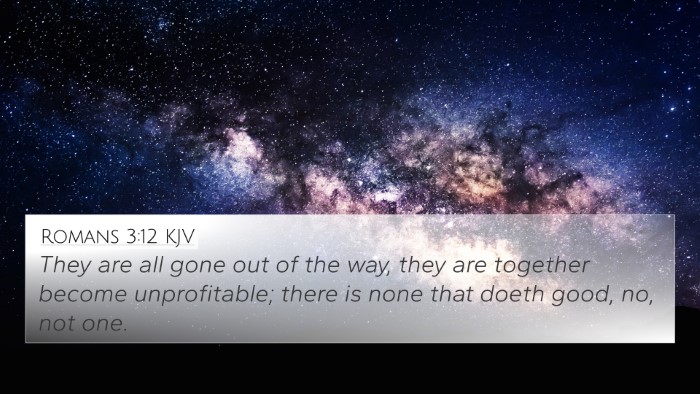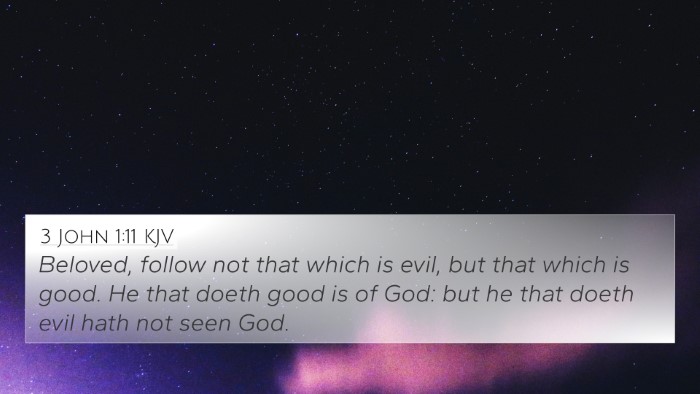Understanding Psalms 53:3
Psalms 53:3 states: "Every one of them has gone back; they are altogether become filthy; there is none that doeth good, no, not one."
This poignant verse encapsulates the human condition as viewed through the lens of scripture. It is a declaration of the pervasive nature of sin among humanity, affirming the complete moral failure inherent in every person without the grace of God.
Summary of Insights from Commentaries
- Matthew Henry: Henry emphasizes the total depravity of man. He outlines that this verse serves as a reflection on the universal sinfulness, asserting that without divine intervention, no human can achieve goodness. He suggests this is a powerful reproach aimed at the pride of human self-righteousness.
- Albert Barnes: Barnes explains that this verse denotes a total departure from God’s teachings. He elaborates that the text is often associated with the judgment upon the ungodly and highlights the absence of any who do good—reaffirming the need for repentance and divine grace.
- Adam Clarke: Clarke underscores the metaphorical sense in which “filthy” is used, indicating moral corruption. He points out that this verse echoes the sentiments found in other Biblical texts regarding human sinfulness, linking it to both Old and New Testament themes.
Bible Verse Cross-References
This verse connects with several other passages that speak to the themes of sin and the human condition. Here are some important cross-references:
- Romans 3:10-12: "As it is written, There is none righteous, no, not one: There is none that understandeth, there is none that seeketh after God."
- Genesis 6:5: "And God saw that the wickedness of man was great in the earth, and that every imagination of the thoughts of his heart was only evil continually."
- Isaiah 53:6: "All we like sheep have gone astray; we have turned every one to his own way; and the LORD hath laid on him the iniquity of us all."
- Jeremiah 17:9: "The heart is deceitful above all things, and desperately wicked: who can know it?"
- 1 John 1:8: "If we say that we have no sin, we deceive ourselves, and the truth is not in us."
- Ephesians 2:1-3: "And you hath he quickened, who were dead in trespasses and sins; wherein in time past ye walked according to the course of this world..."
- Psalm 14:3: "They are all gone aside, they are altogether become filthy: there is none that doeth good, no, not one."
Connections Between Bible Verses
This verse and its references narrate a comprehensive picture of humanity’s relationship with sin and God. By understanding these connections through:
- Thematic Bible verse connections: The verses collectively establish the concept of total depravity and the necessity for redemption.
- Comparative Bible verse analysis: Analyzing these verses reveals consistent reiteration of the sinful nature of man across different contexts and laws, embodied in both the Old and New Testaments.
- Bible verse parallels: Psalms 53:3 parallels Romans 3:10-12, showing a shared theological foundation regarding human righteousness.
Tools for Bible Cross-Referencing
To deepen understanding, consider utilizing the following:
- Bible concordance: Crucial for finding where terms and concepts connect.
- Bible cross-reference guide: Helpful in navigating through interconnected scripture.
- Cross-reference Bible study: Engaging in this method enriches comprehension of Biblical themes.
Conclusion
Psalms 53:3 is more than a declaration; it is an invitation to explore the depths of scripture and the breadth of human sinfulness. Leveraging thematic connections, parallels, and inter-textual analysis enriches one’s understanding and appreciation of God’s grace as contrasted with human frailty.
Further Study Suggestions
For those looking to delve deeper, consider:
- Engaging in detailed cross-reference studies on the themes of sin and redemption.
- Exploring the implications of human depravity in contemporary contexts.
- Analyzing the responses of redemption presented in the New Testament in contrast to doctrines in the Old Testament.















